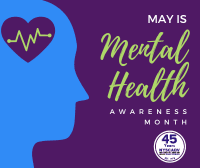
This month, NYSCADV recognizes May as Mental Health Awareness Month, a time to raise awareness about mental health and the importance of caring for our mental well-being. Mental health affects every aspect of our lives, including our relationships, work, and overall quality of life. Domestic violence is a complex issue that intersects with mental health.
Mental health is a critical component of well-being and impacts our thoughts, feelings, and behaviors. Various factors such as genetics, environment, and life experiences can influence it. Mental health disorders can range from mild to severe, including anxiety, depression, bipolar disorder, and schizophrenia.
Unfortunately, mental health conditions are often stigmatized and can be a barrier to seeking help. According to the National Alliance on Mental Illness (NAMI), approximately 1 in 5 adults in the United States experience mental illness each year. However, only 43% of those individuals receive treatment. Mental Health Awareness Month aims to break down these barriers and encourage individuals to seek help.
Experiencing domestic violence may also be an impacting factor on the mental health of individuals. Domestic violence is a pattern of behavior used by one person to gain power and control over another person in an intimate relationship. It can take many forms, including physical, emotional, and sexual abuse. Domestic violence can have long-lasting effects on mental health, including depression, anxiety, and post-traumatic stress disorder (PTSD).
Mental health conditions can make individuals more vulnerable to domestic violence, and experiencing domestic violence can exacerbate mental health conditions. According to the National Domestic Violence Hotline, 1 in 4 women and 1 in 9 men experience severe intimate partner physical violence, intimate partner contact sexual violence, and/or intimate partner stalking with impacts such as injury, fearfulness, post-traumatic stress disorder (PTSD), use of victim services, contraction of sexually transmitted diseases, etc.
It is essential to recognize the impact of domestic violence on mental health and address both issues together. This means providing mental health services to individuals who have experienced domestic violence and addressing the root causes of domestic violence, such as power and control dynamics, in mental health interventions.
Here are some resources to assist advocates in their work:
- #MoreThanEnough Campaign, National Alliance on Mental Health - Help raise awareness this May by using their social media toolkit.
- NYSCADV Self-Care Toolkit: Recognizing the importance self-care plays into an individuals mental health, NYSCADV has compiled a list of resources, for advocates and organizations, on topics including self-care, well-being, and resilience. Included are webinars, toolkits, and additional resources to help advocates take care of themselves and to support the work that they are doing.
- Family-Centered Toolkit for Domestic Violence Programs, National Center on Domestic Violence, Trauma & Mental Health- The Family-Centered Toolkit helps programs envision and implement an integrated approach that supports parent-child relationships and families with a range of culturally responsive, trauma-informed, and developmentally sensitive services.
- Resources for Advocates – Trauma-Informed DV Advocacy, National Center on Domestic Violence, Trauma & Mental Health: This training and resource center contains webinars and resources to support domestic violence advocates in support survivors with mental health, trauma and substance misuse.


